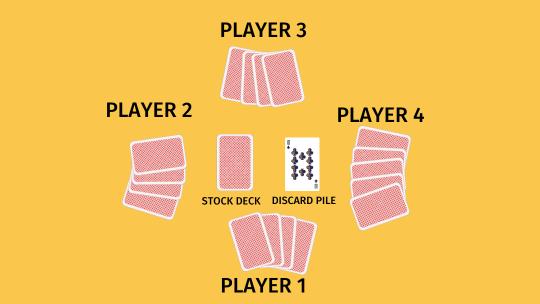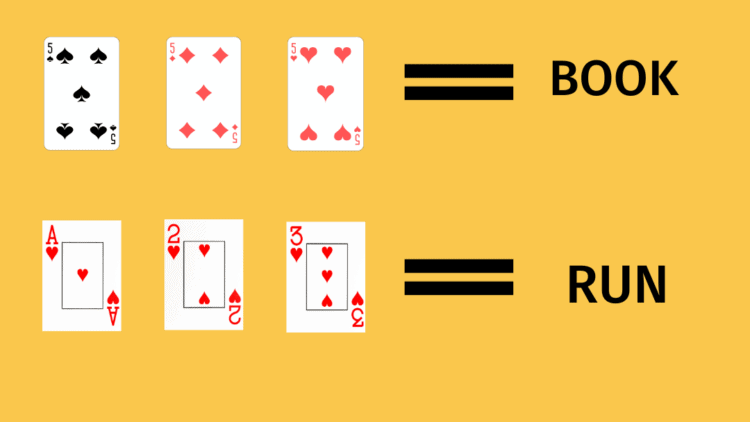
OBJECTIVE OF TONK: Play all cards in hand or have the lowest value non-pair in hand at the end of the game in order to win the stake.
NUMBER OF PLAYERS: 2-5 Players
MATERIALS OF TONK: 52-card deck
TYPE OF GAME: Card game
AUDIENCE: All ages
OVERVIEW OF TONK
Anybody who loves card games has inevitably played a rummy-style game. Tonk is yet another game with a similar style. Tonk, or Tunk as it is sometimes referred to, is a knock rummy and conquian game from the United States. It is supposed to be a descendant of a Filipino card game, “Tong-Its.” It was a popular card game among jazz players in the 1930s and 40s. Let’s go over the rules of this fun game.
SETUP FOR TONK
Tonk is a game you can play with up to six people. You can play with as little as two, but the more the merrier. Besides a few friends, all you need to play Tonk is a flat surface and a standard 52-deck of cards. Many people play Tonk for money, but this isn’t a necessity. You can use poker chips or coins or even play without any gambling involved.
To determine a dealer, each player takes one card. The player with the highest card is the dealer.
DEALING

The dealer passes each player five cards, one at a time, starting to their left. These cards are kept secret from other players.
Once everyone has their cards, place the remaining pile of cards in the center of the table facedown to create the stock deck. Flip the top card face up next to it to create the discard pile.
At this point, players can decide the foundational stake – the amount that will be paid to the winner.
TONK
If your hand initially sums to 49 or 50 points, you must declare “Tonk” and show your cards. You don’t play this hand, and you receive twice the stake from each player. If there is more than one player with a hand totaling 49 or 50 points, it is a draw. Neither is paid. Collect all the cards and deal again. This only applies to your initial hand; if you get cards totaling 50 later in the game, it doesn’t mean anything.
HOW TO PLAY TONK
Now that everything is set up, you can start playing. A turn consists of three parts: The draw, spread, and discard
DRAW
The first player to the left of the dealer starts by drawing a card. You can draw from the facedown stock deck or take the top card of the discard pile. Now, you can keep this card in order to help you make a spread or meld with your cards and then discard another card you don’t want. Unlike some Rummy games, in Tonk, you can discard the card you just drew if you don’t want it.
SPREAD

You are trying to create spreads in order to get rid of the cards in your hand just like in rummy. A spread is made of three or more cards that you remove from your hand and lay on the table. There are two kinds of spreads:
- Books consist of three to four cards of the same rank. For example, J-J-J or 4-4-4-4
- Runs consist of three or more cards in sequence from the same suit. For example, (spades) A-2-3-4. Ace counts as a low card.
HITTING
Another thing you can do is called hitting. This is when you play cards onto spreads that are already on the table, either your own or other players. For example, if there is a spread on the table of (Clubs) 5-6-7 and you have 4 clubs in hand, you may add that to the spread during your turn (before discarding).
DISCARD
After you have laid down the spreads you want, you can end your turn by discarding a card. Take the card from your hand and place it face up on the discard pile.
GOING OUT
When you have gotten rid of all the cards in your hand, you have gone out. Each player, besides the one who went out, gets one more turn to improve their hand. Then, you can add up the points.
If play does not end with someone playing all their cards or knocking, play until the stock runs out (dry), and players play all the cards they can within their hand. The play ends when a player does not wish to take from the discard (but rather the empty stock.)
THE DROP

The drop is something that you can do during the game if you think you have the lowest total in your hand. If you declare a “drop,” then you and all the other players must lay out all your cards on the table.
- If you do have the lowest total, you automatically win the round and the basic stake.
- If someone else has a lower total hand than you, you automatically lose, and you have to pay double the stake to each player who has an equal or lower hand.
- Also, the player who actually held the lowest hand receives the basic stake from each player. If there is a tie for low hand, both players are paid the stake. This is called a catch.
In order to keep players from dropping every round after they lay down a spread, you can create rules around dropping. A good rule is that you have to take at least three turns, and you can’t have had anyone hit one of your spreads.
SCORING
Once someone goes out, then you add up the cards left in your hand. The card values in Tonk are as follows:
- Face cards: 10 points
- Aces: 1 point
- Number cards: face value
Once a player reaches 100 points, they are out of the game and don’t play in the next rounds.
END OF GAME
The last person left in the game is the winner.
POST-PLAY (PAYOUT)
If a player plays all their cards without discarding, this is also a “tonk,” or the player has “tonked out.” They receive double the stake from each player.
If a player runs out of cards after discarding, the player with the empty hand collects the basic stake from each player.
If the stock runs dry, the player with the lowest sum receives the basic stake from each player.
VARIATIONS
Tonk is a pretty simple game, so you can change up some of the rules. Many players have their own house rules they implement during their games. Here are some basic rule variations you can use.
1. After the deal, you don’t form a discard pile. The first player draws from the stock, and the discard pile begins with their first discard.
2. You can deal out as few as three cards or as many as seven, depending on your own rules or on the number of players.
3. It is illegal to hold a spread in hand. If you have a spread, you must place it down. There is an exception in which three Aces may be held in hand. This rule seems strange from an enforcement perspective since hands are supposed to be secret.
4. Players can win double the basic stake if they make a new spread and get rid of all their cards without discarding. However, they can only win the basic stake if they only hit spreads and run out of cards without discarding.
TONK STRATEGY

As with most games, there will always be some strategy you can use to have a better chance of winning. Tonk is no different. Let’s discuss some basic Tonk Strategy.
GET RID OF CARDS
This is such an important rule because, at the end of the day, you want to have the lowest hand possible. You should try to avoid holding on to cards unnecessarily in case someone ends up ending the round.
DISCARD STRATEGICALLY
On the other hand, you want to make sure you discard strategically. You want to get rid of your cards early in the game to minimize your total. However, you should be wary of discarding cards that could help your opponents get rid of their cards.
WATCH YOUR OPPONENTS
This is another important tip. Keep an eye on your opponents. You can get a pretty good insight into their strategy by watching the cards they discard. Look at what they pick up from the discard pile to try and guess what they are building, and make sure you don’t help them with your own spreads.
If you like Tonk, check out Knock Rummy or Three Card Rummy
FAQ
How Do You Win Tonk?
In Tonk, you win the round by discarding all your cards before your opponents. In order to win the game, you have to be the last person in the game and eliminate all other opponents.
What Is the Ace Worth in Tonk?
In the game Tonk, Aces are worth one point when adding up scores.
Can You Hit Yourself in Tonk?
You can “hit” your own spread in Tonk. However, this means you can no longer “drop” in this round.
Can You Play Tonk with Two Players?
Yes, you can play Tonk with only two players, although five to six players are optimal.
- 20+ Epic Outdoor Drinking Games - June 28, 2024
- 30 Gifts for Board Game Lovers - June 27, 2024
- 33 Games for Church Youth Group - June 21, 2024